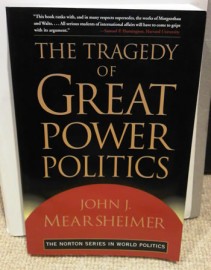
Review of:
The tragedy of great power politics, John Mearsheimer. Published by W.W.Norton, 2001
Does America need a foreign policy? toward a diplomacy for the twenty-first century. Henry Kissinger. Published by Simon and Schuster, 2001
The axioms of balance-of-power in politics, be they Bismarckian pragmatism, Realle Politique or any other guise are assumed as being enduring. Despite their robust advocacy of these perennial axioms, the two books under review place this assumption under severe test and find it wanting in the post-cold-war context.
John Mearsheimer is a fatalistic believer in realle politique. Basing his analysis of international relations the period since 1792, he argues in his preface ‘that multipolar systems which contain an especially powerful [hegemonic] state’ are destabilizing. Moreover, according to Mearsheimer, there is no such thing as absolute trust even between allied States.
Reading this in current circumstances, one shudders. It is an analysis of international relations that crystallises the increasingly illogical character of the Anglo-American “Special Relationship”. That relationship only becomes politically logical if one rejects Mearsheimer’s definition of power, namely, power based on tangible assets such as economic wealth, armoured divisions and nuclear weapons. It is a relationship that only makes sense when one replaces Mearsheimer’s definition of power with a more inclusive definition that includes social, cultural and psychological dominance of one state over another.
Mearsheimer’s definition of political power, in all its guises, is analytically wanting in consequence. He defines military power strictly in terms of sea power, strategic air power, land (implicitly constitutional – i.e. the army) power and nuclear power. Such a constricted definition ignores the impact of guerrilla warfare in political assessments. Given that Mearsheimer designates the strength of a state’s army as the true measure of its power, this analytical omission increasingly jars. Significantly, Mearsheimer avoids analysing the United States debacle in Vietnam with all the socio-political ramifications it challenges realle politique theoreticians to rationalise.
His avoidance of this major cold-war episode, the episode that punctured the myth of American invulnerability, pinpoints the degree to which Mearsheimer has a cold-war axe to grind. He asserts that the United States ‘had no choice’ but to intervene on behalf of western Europe against the Soviet Union after the second world war. He asserts this strictly on the basis of balance-of-power theory, ignoring all considerations of cultural and bureaucratic perceptions that probably played a decisive subconscious element in the Truman Administration’s decision to intervene. One doesn’t need to wholeheartedly support conspiracy theories to question Mearsheimer’s unqualified assertion.
Mearsheimer’s one-dimensional conceptualisation of the geo-political is useful, however. It stimulates one into redefining one’s conception of that term. Thus modified, the geo-political takes on a holistic dynamic that encapsulates the economic, social and cultural dynamics of a given geographic area, thereby injecting a more contemporary resonance into the term.
Mearsheimer’s political “realism” possesses the same quaint quality as Henry Kissinger’s, but is less scary because he is just an academic.
The first sentence in Henry Kissinger’s book questioning America’s need of a foreign policy reads: ‘At the dawn of the new millennium, the United States is enjoying a pre-eminence unrivalled by even the greatest empires of the past’. Reading this sentence the just after hearing of New York’s third plane crash within two months gives a poignant focus on his argument. That the probable cause of this third crash was accidental hardly lessens the poignancy.
This poignancy gets re-enforced by the central thrust of Kissinger’s supposition, namely that the increasing transatlantic tensions over global issues favour the United States adopting an even greater hegemonic role in international affairs. He justifies this by questioning Joschka Fischer’s reflection on Germany’s need to focus its foreign policy more upon the United Nations than upon Nato.
To the degree that Kissinger’s thesis has validity, it is validity reflecting the post-cold-war European political establishment’s inadequacy. As a consequence, Nato’s expansion has been transformed into a regional United Nations by default whilst still under Washington’s control. In terms of Europe’s failure of collective political will, Kissinger’s case has an embarrassing logic.
Kissinger’s impulsive equation of the free-market economy with his cold-war definition of democracy questions his analytical detachment, however. This becomes apparent in his analysis of Latin America. It presents a challenge not to accept his Dr. Strange Love persona. It is a contemporary legend that gets compounded by the unresolved dichotomy between his observations of the region and his resistance to advocating obvious social-market solutions for the region’s chaotic state.
This stereotyped imagine gets re-enforced by Kissinger’s monopolistic conception of international relations. Advocating the creation of a Transatlantic Free Trade Area as a means to rationalise transatlantic relations, for instance, he nonetheless opposes the dilution of Washington’s hegemony either within the North American Free Trade Area or within the Western Hemisphere as a whole. Either one rejects pragmatic Bismarckian balance-of-power principle and accepts Kissinger’s justification of United States post-cold-war hegemony in international relations, or one classifies Kissinger as power deranged.
Kissinger argues that the advent of globalisation is symptomatic of the world accepting the free-market as practised by the United States. Conceding that free-market induced economic depressions will intensify as a result of globalisation, he acknowledges the inevitability of socio-economic disruption and consequent political crises. It is a fatalistic basis of analysis that justifies United States global hegemony by default. Give Kissinger his due, however. He concludes by accepting this hegemony will ultimately result in United States decline.
This article was contributed by John Williams, who may be contacted at [email protected]. The opinions expressed are those of the author and not necessarily those of Federal Union.
